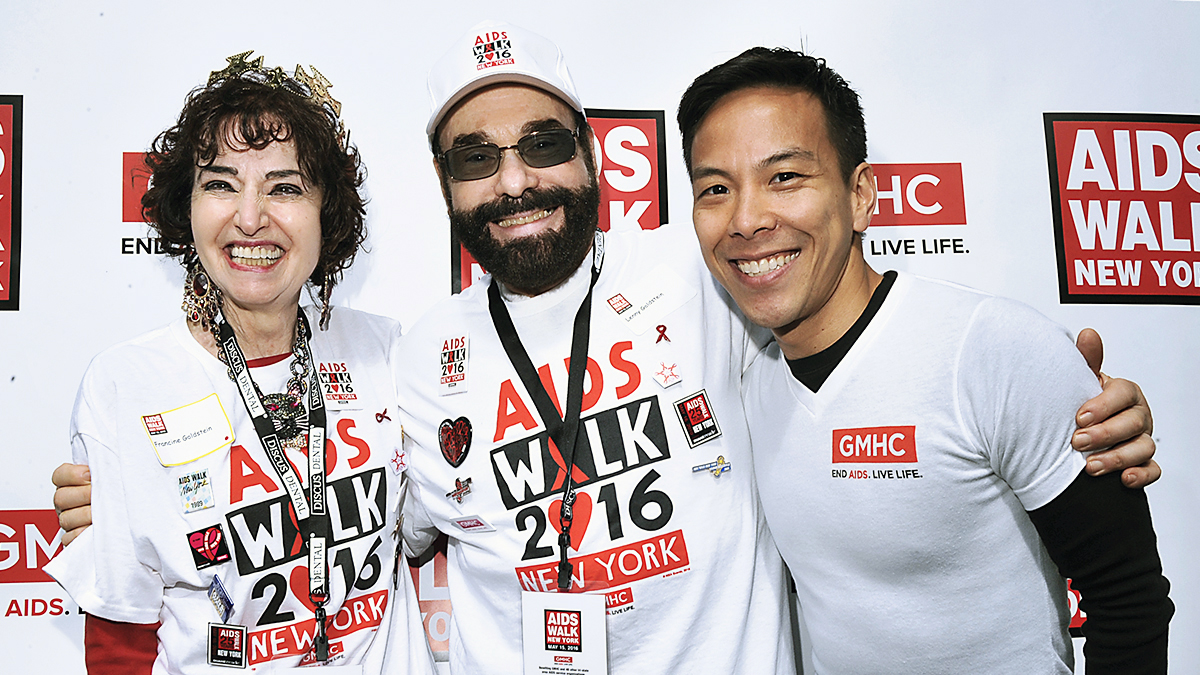Francine Goldstein, one of GMHC’s most stalwart AIDS Walk New York supporters, is busy. She’s emailing and calling everyone she knows to reach her ambitious $70,000 fundraising goal before the walk’s return to Central Park on May 15.
Goldstein has been AIDS Walk New York’s top fundraiser for the last three years, raising over $63,000 last year alone—but she wants to do more. “Every year I try to do better,” she said.
Now on her 34th AIDS Walk, Goldstein has raised a lifetime total so far of $815,000. What keeps her going is a promise she made long ago to her best friend, who died of AIDS-related complications on April 13, 1991.
“It changed my life,” she said. “We were like sisters, and I watched her go from 120 pounds to 43 pounds in hospice care a week before she died. I told her that I never want to see anyone suffer like she did.”
Her friend was diagnosed with pneumonia in 1988, just after she’d delivered her first child prematurely. After a lung biopsy, the diagnosis changed to AIDS. Goldstein said her friend, who was married and heterosexual, was afraid of the stigma around AIDS. “I told her, ‘I’ll never abandon you.’”
Her friend had been prescribed AZT, the only medication available at the time to treat AIDS, but it cost $8,000 a month. Goldstein and her husband, Lenny, had joined GMHC right after it formed in 1982, and so she turned to the agency for help.
GMHC secured a drug discount card to defray the cost, and the agency’s staff helped obtain the legal and medical services that Goldstein’s friend needed. “Volunteers from GMHC came to visit her in the hospital. They helped her write letters when she couldn’t write anymore,” Goldstein said.
“My husband and I saw her every week until she died. We never wore gowns or shields. We did not want to cave into the stigma,” she added.
First AIDS Walk
Goldstein signed up for her first AIDS Walk New York in 1988, soon after her friend was hospitalized. “When I saw what GMHC did for her, I thought, ‘I’ve got to do this,’” she said.
That first year, her only sponsors were her husband and their two dogs. But she gained confidence every year and started asking more people to support her—at first, family and friends, and then her co-workers.
Goldstein worked for Empire Blue Cross Blue Shield at the time, handling collections. “I’m a very nice person, but if you owed me money, I’d haunt you,” she said wryly.
She started asking her accounts, all very large companies, to sponsor her. Some are still her biggest supporters, she said. It wasn’t too long before she convinced Empire BCBS to become a corporate sponsor—and then to start an AIDS Walk team. “That took away some of the stigma around AIDS,” she said.
On her lunch hour, Goldstein started canvassing her co-workers at the World Trade Center, where Empire BCBS had about 2,000 employees. Then, she began visiting other companies in the skyscraper. “I’d go from group to group with my sponsor forms. People started donating, and they’d introduce me to other people in their department. It started building from there.”
“The response was terrific,” she said, somewhat to her surprise. “So many people said, ‘Of course. We have somebody in our family dealing with HIV. They’d say, ‘It’s not just your friend you’re walking for—it’s my brother-in-law, sister, parent, uncles.”
“They’d tell me how much this disease has affected them and thank me for walking on their behalf,” she added.
That’s still true today. Not too long ago, Goldstein asked a New York legislator’s staff member to sponsor her. “I’d never spoken to her before—and she shared with me that her father died of AIDS. She has been a tremendous supporter.”
Since she and her husband are very involved in local Democratic politics, Goldstein asks every political candidate she supports to support her cause as well. “I’m not shy,” she said.
“I couldn’t do this without my husband,” Goldstein added. “He’s been so wonderful and supportive about helping me raise money for the walk.”
“People should never be afraid to ask,” she advised. “If you don’t ask, you don’t get.”
Keep on Walking
In her 34th year of walking, Goldstein has no intention of retiring from fundraising for AIDS Walk New York. “Is there a vaccine? Is there a cure?” she asked. “There is still stigma and prejudice around HIV. I want to make a difference.”
“Look at all the things GMHC does that people living with HIV need,” she said. “The legal, the mental health, the testing services—and the food deliveries. Look at what happened with COVID-19. Immunocompromised people were marginalized with this virus and couldn’t go out. GMHC helped them stay fed.”
While there are medications now to treat and prevent HIV, they “don’t solve everything,” she added. “People who are long-term survivors have other health issues.”
“When that vaccine comes, I’ll support other things—but not yet,” Goldstein said.
Join us! You can sponsor Francine Goldstein here. Or, go ahead and register to walk.

